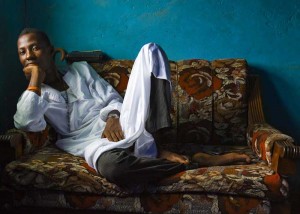freeDimensional
Show on African homosexuality shut down after fundamentalist attack
Posted on June 9, 2014 | No Comments

Senegal exhibition, part of the Dak’Art Biennale, closed due to pressure from extremist Islamic groups.
By: Anny Shaw
The Senegalese government has shut down one of the first exhibitions in Africa to focus on homosexuality on the continent. The move comes several weeks after an attack on the Dakar gallery by Muslim fundamentalists, says the French-Algerian artist Kader Attia. “Precarious Imaging: Visibility and Media Surrounding African Queerness” opened at Raw Material Company on 11 May, but a day later, the non-profit art centre was vandalised and the building damaged, according to Attia, whose video about the lives of transsexuals in Algiers and Mumbai was included in the show. No one was hurt in the attack.
Following pressure from extremist Islamic organisations, the exhibition, which was part of the informal programme for Dak’Art 2014, the 11th Biennale of Contemporary African Art (9 May-8 June), was cancelled on 31 May. According to the news service Times24.info, the Senegalese government also ordered the suspension of all exhibitions in the biennial that refer to homosexuality. Raw Material Space remains closed, according to a spokeswoman for the biennial, who could not confirm if any further exhibitions had been shut down.
“Senegal is well-known for its peaceful and moderated Islam. Such an aggressive attack is absolutely unexpected, as is the government’s decision to shut down all the exhibitions in the biennial that deal with homosexuality,” Attia says. “It is highly concerning that a country that has always been protected from fundamentalism is now opening the door through an official path.”
The aim of the “Precarious Imaging” exhibition, which was co-organsied by Koyo Kouoh, the artistic director at Raw Material Company, and the independent curator Ato Malinda, was to shed light on a persecuted African minority. Homosexuality is illegal in Senegal, as it is in 37 other African countries, according to Amnesty International. Malinda told The Art Newspaper in April that a leading academic had advised the gallery against holding the exhibition. “The show will cause controversy, but we will not censor ourselves,” Malinda said at the time.
Alongside Attia’s video, the exhibition featured photographs of gay men from Lagos by the Nigerian artist Andrew Esiebo; a photographic series of black lesbian and transgender women by the South African activist and photographer Zanele Muholi; a video of Egyptian women smoking by the Egyptian-American artist Amanda Kerdahi M.; and works from Jim Chuchu’s “Pagan” series. Raw Material Company could not be reached for comment at the time of publication.
Text and image reposted from TheArtNewspaper.com
Photo credit: Nigerian photographer Andrew Esiebo’s ongoing series “Who We Are” portrays gay men from Lagos
Tags: 'Precarious Imaging' > Ato Malinda > Dak'Art Biennale > Koyo Kouoh > Raw Material Space > Senegal
Comments
Leave a Reply









